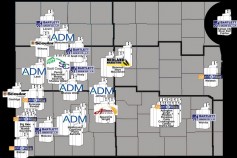Breadcrumb
- Home
- Recent news stories
- Contact elevators now to deliver hard white wheat at harvest
As Kansas wheat harvest approaches, farmers are making all necessary preparations. One of the most important is knowing where to market harvested grain. Kansas Wheat strongly encourages farmers planning to deliver hard white wheat to an elevator at harvest to communicate with their elevator now.
While a number of elevators will be accepting hard white wheat, others have indicated that they will help find a market for your grain, but that they need to have some advanced notice that you will be delivering to their location.

Hard white wheat accounts for about three percent of the wheat grown by Kansas farmers, but the number of acres of hard white wheat is increasing every year. The majority of the white wheat is planted in the southwestern portion of the state.
Hard white wheat isn’t just turning farmers’ heads. Companies, like Archer Daniels Midland Company (ADM), have invested in the future of hard white wheat. Three years ago ADM partnered with the Kansas Wheat Commission Research Foundation and the Kansas State University wheat breeding program at Hays to strengthen hard white wheat variety development. The investment has allowed wheat breeder Guorong Zhang and his colleagues to use molecular marker and doubled haploid technologies to develop new white wheat experimental varieties suited for the baking industry, while also offering farmers improved yield and agronomic traits.
Overseas customers are also seeing value in hard white wheat. According to Peter Lloyd, Regional Technical Director at U.S. Wheat Associates, the large Nigerian flouring milling companies are interested in increasing the amount of hard white wheat they are able to purchase.
“All of the large Nigerian flouring milling companies would like to double or triple or quadruple the amount of hard white wheat that they are able to buy,” said Lloyd. “We are at a disadvantage because of logistics. We have growers who are happy to grow white wheat, and we have customers in Nigeria and all other parts of the world who would love to buy it, but getting it from the farm to the customer is the issue. We must leverage all of the many years of varietal development, grading and inspection and good farming practices for our growers to make the best profit that we can in the international marketplace. I believe the best route for that is hard white.”
By Jordan Hildebrand
